Jazz Appreciation: Moppa Elliott Does It All for You
By Steve Elman
Moppa Elliott is an important jazz composer and a dynamic leader. When he brings a group to our area (which happens only rarely), do not miss the gig. When he issues a new recording, pay attention.

Moppa Elliott in a buttoned-down pose, with saxophonist Jon Irabagon accompanying him on concertina. Photo: courtesy of the artist
Composer-bassist Matthew “Moppa” Elliott turned 45 in September. This means he is entering a period that is too often the doldrums of a music career — too old to be a new discovery and too young to be an honored senior.
This is precisely the time when many musical artists do their most interesting work. They have the experience to know what they really want to accomplish and the abilities to make it happen, usually unimpaired by the encroachment of time. Ironically, this is also the period when many artists who have not had major career success begin to be taken for granted — or worse. Those who have heard of the artist at one point might say, “I’ll hear her (or him) next time they come to town,” or “Oh, here’s another record from so-and-so,” or even “Who? Oh, yeah, I remember him (or her).”
You should not make these mistakes with Moppa Elliott. He is an important jazz composer and a dynamic leader. When he brings a group to our area (which happens only rarely), do not miss the gig. When he issues a new recording, pay attention. (He has just issued two, which I review in a companion post.)
He made his first recording in 2001 (Pinpoint, issued on his own Hot Cup label) when he was a student at Oberlin College, with trumpeter Peter Evans and saxophonist Charles Evans in the ensemble, both of whom would become part of his working bands. This is already a remarkably mature album, with Elliott showing a beautiful sound and great chops on bass (example: he saddles himself with a lot of the rhythm and almost the entire harmonic foundation on “Pinpoint,” calling for a loping 3/4 tempo and note-perfect double-stops, which he executes precisely throughout). The compositions here are not as adventurous as his later pieces, but they go well beyond the conventional ideas of small-group jazz at the turn of the century. Charles Mingus’s influence is obvious on “Talked Down.” “Blues for Hawes” shows considerable ingenuity within a standard form. And Elliott’s rearrangement (with a countermelody) of Ornette Coleman’s “Peace” is particularly noteworthy. The only flaw of the recording is a bit of tentativeness in the other players’ execution.
Three years later Elliott crashed into general jazz consciousness with a bang. He debuted a quartet he called Mostly Other People Do the Killing (hereafter MOPDtK), which included three other outstanding players – trumpeter Peter Evans, saxophonist Jon Irabagon, and drummer Kevin Shea, none of whom had made names for themselves at the time. The moniker of the group, which was also the name of the debut CD (Hot Cup, 2004) “was inspired by a quote attributed to inventor Leon Theremin [the creator of the electronic instrument which bears his name] — a survivor of the Soviet gulag who exonerated Stalin because ‘mostly other people did the killing.’” (Troy Collins, allaboutjazz.com, January 2013). The cover showed humanoid pictograms engaged in a variety of homicidal mayhem. This planted a “bad boy” flag in the jazz ground right away for Elliott, but it also attracted a lot of critical attention.
Wikipedia says: “In 2009, Mostly Other People Do the Killing was the winner of the 57th Annual DownBeat Critics’ Poll in the Rising Star Ensemble category. [Trumpeter] Evans, [saxophonist] Irabagon, and Elliott were also included in the poll in the respective categories of Rising Star Trumpet, Rising Star Alto Saxophone, and Rising Star Composer . . . [Drummer] Kevin Shea was named New York City’s ‘Best Drummer’ in 2012 by the Village Voice.”
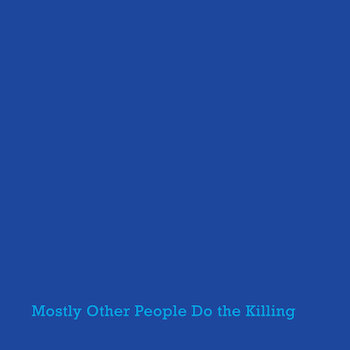
The cover of Blue, a note-for-note re-creation of Miles Davis’s Kind of Blue.
I became aware of MOPDtK around 2009, when Elliott was in the middle of a quartet of releases with jacket designs that meticulously parodied those of famous older jazz releases (thanks again to Troy Collins for all the data details here). The graphics of Shamokin!! (Hot Cup, 2007) adopted the typeface and colors of Art Blakey’s A Night in Tunisia (Blue Note, 1960); the jacket of This Is Our Moosic (Hot Cup, 2008) posed the four members of MOPDtK in a studio shot that duplicated the cover portrait on Ornette Coleman’s This Is Our Music (Atlantic, 1960), with each musician standing in the same position and adopting the same attitude as the corresponding member of Ornette’s band; the cover of Forty Fort (Hot Cup, 2010) did the same thing in a park setting, with MOPDtK imitating the poses of the players shown on the cover of drummer Roy Haynes’s Out of the Afternoon (Impulse!, 1962), going so far as to have Irabagon pose with a wooden walking stick a la Roland Kirk on the original; when the group issued a live date from Portugal called The Coimbra Concert (Clean Feed, 2011), the cover design duplicated the austere look of Keith Jarrett’s The Köln Concert (ECM, 1975), with drummer Shea (I think) adopting Jarrett’s intense-concentration pose at a piano.
The parody aspect went further, with each package including some of the most pretentious liner notes ever written, all attributed to “Leonardo Featherweight.” (Leonard Feather, it must be said, never wrote anything so prolix.)
Along the way, the original tunes on the CDs (all by Elliott) had odd titles that proved to be the names of towns in Pennsylvania. (A bit more on titles in the appendix to this post.)
“Who ARE these guys?” I wondered. When I set the packages down and actually heard the music, I was delighted and intrigued. I was one of the few MOPDtK enthusiasts in the audience when they played a concert in the performance space at the Institute of Contemporary Art in September 2012, soon after the museum had relocated to the Seaport. Guitarist Marc Ribot was the headliner that night, but Elliott’s band stole the show, and they erased Ribot’s performance from my memory. Each of the members of MOPDtK made a forceful impression, and I left shaking my head.
What did they sound like? Well, that great quartet has been captured at least three times in live recordings – on The Coimbra Concert, on Hannover (Jazzwerkstatt, 2015) and on (Live) (ForTune, 2016). You don’t need to hear me effuse. Go listen to “Round Bottom, Square Top” from The Coimbra Concert.
This band was doing the kind of killing I hadn’t heard since I had encountered Boston’s free-jazz monsters The Fringe.
Not that MOPDtK’s music was “free jazz,” although it used collective improv as one of its tools. Each piece showed a composer’s hand and a distinct shape. Each told a story, and told it well. The band wasn’t afraid to rock or swing when the composer called for that, which added a lot of tools to the arsenal.
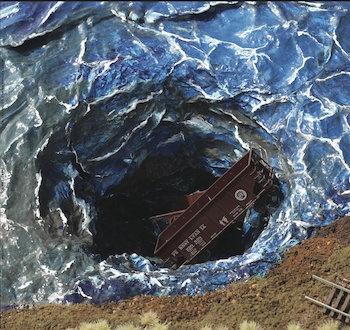
The cover of MOPDtK’s Disasters, Vol. I. The image is a Photoshop evocation of a 1959 calamity in Exeter, PA, where a hole was blasted near the bed of the Susquehanna River, flooding the mine below and forming a giant whirlpool, into which “workers resorted to dumping entire train cars … in a futile attempt to simulate a bathtub plug.” (from the liner notes, attributed to “Leonardo Featherweight”).
In 2011, the Portuguese label Clean Feed offered this description of the group process on their website, and I can’t do any better: “The four members … have developed a style of performance in which each member is free to steer the group in any way they choose. The other members may or may not follow suit, creating a type of group interplay that often pits the individuals against each other. Within any given performance, an individual may try to cue a new composition, a return to the original melody, or other structural device, only to be vetoed, creating music that often features multiple chains of association simultaneously.” The only thing this sketch leaves out is the fact that every tune also has irresistible forward momentum.
Evans and Irabagon were obvious virtuosi, with career ambitions of their own; they soon made their way to recording their own projects as leaders, but in my opinion, neither of them so far has made music on their own as memorable as the music they made with Elliott. As for Shea, he is a very distinctive talent on drums, and the only member of the original group to continue recording with Elliott to this day.
With the growing independence of Evans and Irabagon, Elliott’s group concept of MOPDtK began to change.
Slippery Rock! (Hot Cup, 2013) employed (perhaps) some stronger rhythms than he had used before, but his individual approach was stamped indelibly on the new tunes. It turned out to be the swan song for the original MOPDtK quartet.
Red Hot (Hot Cup, 2013) and its followup Loafer’s Hollow (Hot Cup, 2017) looked and felt like retro projects, employing some old-timey effects, but the music never settled into nostalgia. For the first recording, the original MOPDtK quartet was augmented by the bass trombone of veteran classical virtuoso David Taylor, the banjo of Brandon Seabrook, and pianist Ron Stabinsky, who became the kindred-spirit keyboard player Elliott needed to fill that chair in his subsequent groups. On the second CD, the same group performed with Steven Bernstein (known for his work with Mocean Worker) replacing Evans, playing trumpet and slide trumpet.
Peter Evans was still aboard for the final time with Jon Irabagon and new pianist Stabinsky joining Elliott and Shea for MOPDtK’s most controversial project: Blue (Hot Cup, 2014), a note-for-note re-creation of the most popular jazz release of all time, Miles Davis’s Kind of Blue (Columbia, 1959). Critics were either scornful of it or nonplussed by it, and this survey would not be complete without some comment on it.
Evans played every Miles solo with almost uncanny Davis intonation. Irabagon played BOTH saxophone parts, doing Coltrane’s tenor solos first, recording with the other players, and later overdubbing Cannonball Adderley’s alto saxophone solos (in a different studio!). He mimicked each reed player’s individual sound beautifully, even if he did not quite capture the bite of the original timbres. Ron Stabinsky did Bill Evans perfectly, even comping on the piano just as Evans did behind the original soloists. Kevin Shea was eerily like Jimmy Cobb, down to the rim shots and decorative press rolls. Elliott had perhaps the easiest role, miming Paul Chambers; though I have never listened closely enough to Blue to compare his bass parts with Chambers’s, I have no doubt that he was as faithful to his model as his bandmates were to theirs. The ambience, with its period-style reverb, and the mix, with the drums and bass farther back than they would be in a 21st-century recording, both duplicated the ethos of the original.
Listeners asked why. Elliott included his answer, in a typically tongue-in-cheek fashion, by making the “liner notes” of Blue a reprint of “Pierre Menard, Author of the Quixote,” a famous parody of scholarly writing by Jorge Luis Borges. The Borges work is itself a step through a looking-glass, but it offers one way to think about the rationale for Elliott’s idea. Although any description of Borges’s essay is reductive (and takes the wry humor out of it), it describes the work of a fictional author named Pierre Menard who sought to understand, to enrich, and ultimately to reinvigorate several chapters of Cervantes’s Don Quixote by reproducing them word-for-word. Tucked into the essay is a crucial paragraph deploring how Quixote had acquired unwelcome trappings over time including “patriotic toasts, grammatical arrogance, obscene de luxe editions. Fame is a form — perhaps the worst form — of incomprehension.”
There it is: a plea to re-understand a masterpiece in all its richness, with the added perspective of time. There is no other jazz recording so ambitious in its philosophical goals as Blue; whether or not it was worth it … only Moppa Elliott can really say.
Mauch Chunk (Hot Cup, 2015) made a convincing case for MOPDtK as a saxophone-piano-bass-drums quartet, but this is the only time Elliott has tried it so far. The longest track, “Townville,” is a kaleidoscopic workout for this edition, from time to time edging outside and then reclaiming the drive of the snappy theme, with drummer Kevin Shea, as always, unerringly sensitive to every ebb and flow. Jon Irabagon, playing tenor, jokes about the freewheeling approach by quoting “Bewitched, Bothered and Bewildered,” and he continues to whine quietly on high notes using circular breathing behind Ron Stabinsky’s fine piano solo. Elliott’s characteristically strong bass solo leads into Irabagon again, who gradually comes back to the head, but this time it’s in a different key from the first round. Another free-for-all wraps it up, with three soft saxophone notes, almost as an afterthought, evoking Coltrane’s “Naima.”
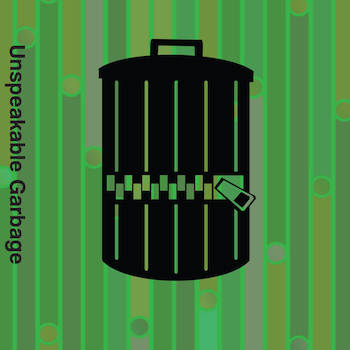
The cover of one of the three parts of Jazz Band / Rock Band / Dance Band. Unspeakable Garbage is the “rock band.””
Paint (Hot Cup, 2017) introduced the piano-trio edition of MOPDtK, and Disasters, Vol. I (Hot Cup, 2023) added a second session for the same band. Ron Stabinsky and Kevin Shea both get full opportunity to display their plentiful talents in these two releases, and Shea is especially impressive. When playing in tempo, he shows off the relaxed, behind-the-beat approach of Elvin Jones and other superb drummers, but it seems to me that as he slips into out-mode, his most direct ancestor is Paul Motian. Like Motian, Shea can convey the effect of falling down a flight of stairs and still somehow make it into music. Stabinsky has every tool of the pianist at his disposal and he uses them all very well. Elliott, as always, is the guiding spirit, a team player, and the rock on which everything rests.
A triple release in 2019 was a message to the world that Elliott had new horizons in mind. The outside sleeve said Jazz Band / Rock Band / Dance Band, but the music inside logically extended ideas Elliott had already begun to explore with MOPDtK. The “jazz band” was a new quintet he called Advancing on a Wild Pitch, with the unusual front line of trombone (played by Sam Kulik) and baritone saxophone (played by Elliott’s bandmate from his first recording, Charles Evans). The “rock band” was named Unspeakable Garbage, an electric ensemble (with Elliott playing electric bass) that provided a rocking foundation for Jon Irabagon to let loose his inner Cornbread Singer and introduce him to Albert Ayler. The “dance band” was another new group, a cooking nonet called Acceleration Due to Gravity (with Elliott again on the electric axe, and another appearance by bass trombonist David Taylor).
To my ears, Acceleration Due to Gravity was the most interesting of the new groups, although the music from the other two was very strong. What made ADtG a “dance band”? Steady tempos, the mighty drumming of Mike Pride, tunes in a compact format (from 3:31 to 5:05 in length) and a general feeling of Saturday night revelry. Elliott was not limited by the format. As an example, hear “Energy,” a 20-bar stomping blues where the band changes keys three times and the solos tear the roof off the sucker — David Taylor kicks it off with some very adventurous plunger playing on bass trombone, followed by Nate Wooley putting his own plunger to work on trumpet; then there is a key change for powerful piano from George Burton and gutsy baritone sax from Kyle Saulnier; then a third key is introduced for solos by Ava Mendoza on fuzz-toned guitar and Matt Nelson on alto; the last key shift ushers in tenor player Bryan Murray and an out-chorus of riffs. Total time: 3:41.
Advancing on a Wild Pitch and ADtG make their second appearances in Elliott’s two new releases, which I discuss in detail in the companion post. Both of the original concepts take new jumps forward, and there is no reason to assume that Elliott has exhausted their possibilities.
In fact, it’s clear that Moppa Elliott’s career is not settling into an easy middle age — not by a long shot. We can and should expect great things from him in the years to come. I, for one, can’t wait to hear what he will do next, and I hope someone in eastern New England will bring him back to our area so that I (and you) can hear him in live performance.
More:
I have not had the chance to hear everything on every Moppa Elliott recording, but I have found him amazingly consistent. Every time I’ve listened to one of his compositions from start to finish, I’ve concluded with a head-shake at his ingenuity and almost always a “Wow” at the playing of his ensembles.
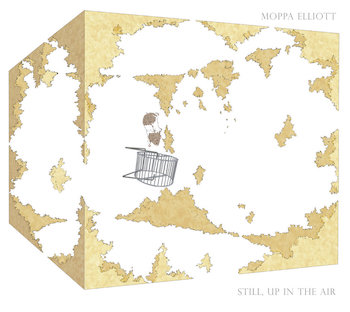
The vertiginous cover of Still, Up in the Air, Elliott’s solo bass album.
He took a break from group work to do a recital for solo bass (Still, Up in the Air [Hot Cup, 2016], where his technique is on full display, both pizzicato and arco.
He also showed his respect for master trombonist David Taylor by playing bass on Dave Taylor Plays the Music of David Taylor (Hot Cup, 2020), the only time I know of that he has appeared on a recording that did not contain one of his own compositions.
A Moppa Elliott discography:
As far as I know, no one has previously compiled a comprehensive list of Elliott’s recordings (at least I have not been able to find one on the net). This is my best effort, with much of the recording data incomplete. I would be happy to hear any corrections or additions.
All releases were issued on Hot Cup, except where noted.
Elliott plays acoustic bass on all the titles, except where noted.
Pinpoint (2001) – w. Peter Evans, tp; Charles Evans, bari; Kelly Roberge, ts / as; Allan Baker, p; Elliott, b; James Kittleman, dm (Rec. 3/11/2001, Oberlin, OH)
Moppa Elliott’s Mostly Other People Do the Killing (2005) – Mostly Other People Do the Killing (Peter Evans, tp, pic tp, bari horn; Jon Irabagon, as / ss; Elliott, b; Kevin Shea, dm) (Rec. 2004)
Shamokin!! (2007) – Mostly Other People Do the Killing (Peter Evans, Irabagon, Elliott, and Shea)
This Is Our Moosic (2008) – Mostly Other People Do the Killing (Peter Evans, Irabagon, Elliott, and Shea)
Forty Fort (2010) – Mostly Other People Do the Killing (Peter Evans, Irabagon, Elliott, and Shea) (Rec. 2008 & 2009, NYC)
The Coimbra Concert (Clean Feed, 2011) – Mostly Other People Do the Killing (Peter Evans, Irabagon, Elliott, and Shea) (Rec. Coimbra, Portugal)
Slippery Rock! (2012) – Mostly Other People Do the Killing (Peter Evans, Irabagon, Elliott, and Shea) (Rec. 4/2012, Mount Vernon, NY)
Red Hot (2012) – Mostly Other People Do the Killing (Peter Evans, Irabagon, Elliott, and Shea; Ron Stabinsky, p; David Taylor, btb; Brandon Seabrook, bjo / elecs;) (Rec. 2012, Brooklyn)
Blue (2014) – Mostly Other People Do the Killing (Peter Evans, Irabagon, Stabinsky, Elliott, and Shea) (Rec. 2013?, Mount Vernon, NY [the principal tracks, with Irabagon playing ts] & Brooklyn, NY [Irabagon’s as tracks])
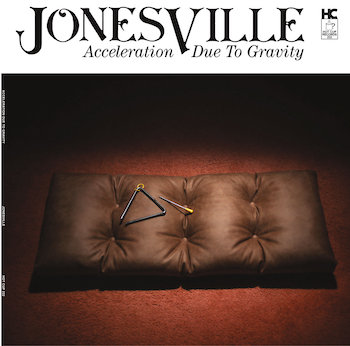
The cover of Jonesville. The triangle is a visual pun on the name of a group in which Sam Jones played bass.”
Hannover (Jazzwerkstatt, 2015) – Mostly Other People Do the Killing (Peter Evans, Irabagon, Elliott, and Shea) (Rec. 2014, Hannover, Germany)
Mauch Chunk (2015) – Mostly Other People Do the Killing (Irabagon, Stabinsky, Elliott, and Shea) (Rec. Mount Vernon, NY)
Still, Up in the Air (2016) – Elliott (solo acoustic bass) (Rec. 2016?, St. Stephen’s Episcopal Pro-Cathedral, Wilkes-Barre, PA)
(Live) (ForTune, 2016) – Mostly Other People Do the Killing (Peter Evans, Irabagon, Elliott, and Shea) (Rec. 10/29/2012, Jazz Klub Hipnoza, Katowice, Poland)
Loafer’s Hollow (2017) – Mostly Other People Do the Killing (Irabagon, Stabinsky, Elliott, and Shea; Steven Bernstein, tp / slide tp; David Taylor, btb; Brandon Seabrook, bjo / elecs) (Rec. 2012?, Brooklyn?)
Paint (2017) – Mostly Other People Do the Killing (Stabinsky, Elliott, and Shea)
Jazz Band / Rock Band / Dance Band (2019) – includes:
Advancing on a Wild Pitch – Advancing on a Wild Pitch [the “jazz band”] (Sam Kulik, tb; Charles Evans, bari; Danny Fox, p; Elliott, b; Christian Coleman, dm)
Unspeakable Garbage – Unspeakable Garbage [the “rock band”] (Irabagon, ts; Nick Millevoi, elec g; Stabinsky, kb; Elliott, elec b; Dan Monaghan, dm)
Acceleration Due to Gravity – Acceleration Due to Gravity [the “dance band”] (Nate Wooley, tp; Dave Taylor, btb; Matt Nelson, as; Bryan Murray, ts; Kyle Saulnier, bari; Ava Mendoza, elec g; George Burton, p, Elliott, elec b; Mike Pride, dm)
Dave Taylor Plays the Music of David Taylor (2020) – Taylor, btb; Stabinsky, p; Elliott, b; Shea, dm
Disasters, Vol. I (2022) – Mostly Other People Do the Killing (Stabinsky, Elliott, and Shea)
Disasters, Vol II (2024) – Advancing on a Wild Pitch (Kulik, Charles Evans, Fox, Elliott, Coleman)
Jonesville (2024) – Acceleration Due to Gravity (Bobby Spellman, tp; Taylor, btb; Nelson, as; Stacy Dillard, ts; Saulnier, bari; Mendoza, elec g; Burton, p, Elliott, elec b; Pride, dm)
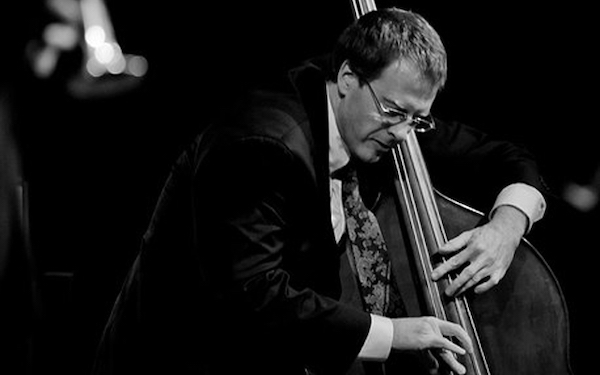
Moppa Elliott in action. Photo: Clemens Mitscher
A note about tune titles:
Rather than extend this long piece even more with a digression about tune titles in jazz, I’ve appended it here for anyone who cares.
Jazz is essentially an abstract music. Since composers of original jazz compositions are required to title their tunes, they often come up with titles that try to capture the mood or spirit of the tunes they write … with indifferent results. (Would any of the tunes on Kind of Blue be any less indelible if it bore a different name?)
Jazz composers with serious ambitions have reached for serious titles, trying to convey the scope of their inspirations. In all too many cases, the titles they choose seem to be overreaching — the clothes are too large for the music they wear. (Just one example from last year: After / Life (Truth Revolution, 2023) by saxophonist Brian McCarthy, where perfectly competent but earthbound tunes with titles like “Kepler’s Law” are supposed to reflect the great sweep of cosmic evolution.)
Rarely, compositions that are truly profound have titles that cannot contain them — Ellington’s “Mood Indigo” hardly does justice to his magnificent idea, and Mingus’s “Goodbye Porkpie Hat” is ironically distant from the genuine grief in a tune that mourns Lester Young. A recent example: Miho Hazawa’s recent “Exoplanet Suite” (on Beyond Orbits, Edition, 2023) has grandeur and power aplenty, but the individual titles (“Elliptical Orbit,” “Three Sunsets,” and “Planet Nine”) almost diminish the music — better to hear it as pure abstraction rather than the expression of an idea, no matter how cosmic.
The perfect match of tune and title is rare — witness the elegance of Benny Golson’s title for “I Remember Clifford” and its perfect expression in the elegiac ballad, or Maria Schneider’s picture in words, “Walking by Flashlight” and its gorgeous realization.
But often titles are added just to give abstract music convenient names. If the composer is savvy enough, the titles are independently evocative. Mingus’s “Remember Rockefeller at Attica” and “Free Cell Block F, ’Tis Nazi USA” are not protest songs like his “Fables of Faubus.” They are jaunty melodies with political slogans painted on them like graffiti on brick walls. Steve Lacy obsessively titled his tunes with nouns (“Raps,” “The Rent,” “Blinks,” “Clichés,” “Wet Spot”) that suggested concepts unconnected with the music. John Scofield has almost made a side identity for himself as a witty coiner of names – “The Boss’s Car,” “Some Nerve,” “Make Me,” “No Way José,” and many others.
Moppa Elliott has followed in this latter tradition, squaring this circle idiosyncratically by titling nearly every one of his pieces after a city, town, or neighborhood in his native Pennsylvania. Titles like “Blue Ball,” “President Polk,” “Mehoopany,” “Gum Stump,” and “Factoryville” seem perfect no matter what the tunes sound like. The fact that his tunes are so good gives each community he names something to brag about.
Steve Elman’s more than four decades in New England public radio have included 10 years as a jazz host in the 1970s, five years as a classical host on WBUR in the 1980s, a short stint as senior producer of an arts magazine, 13 years as assistant general manager of WBUR, and fill-in classical host on 99.5 WCRB.

Thanks for your usual exceptional job. One thing I’d like to bring to light is the group’s humor. There is a video which features drummer Kevin Shea doing just about everything to a drum set except eat it. And that may be in the works. Some may disagree, but I bemoan the loss of a sense of humor in jazz.